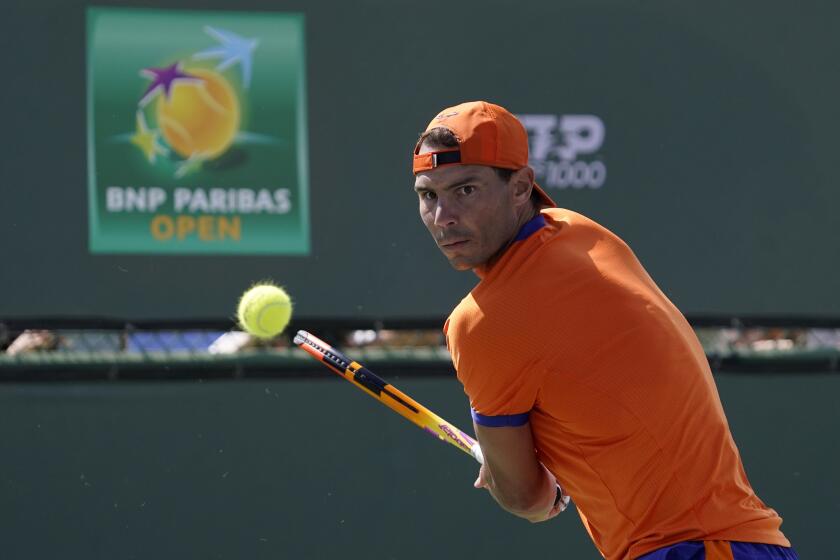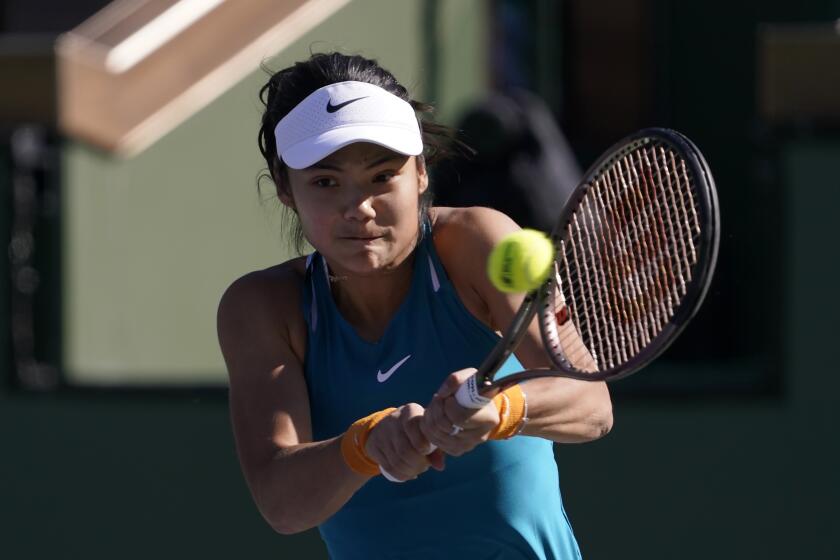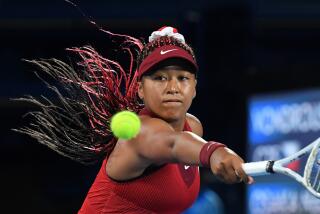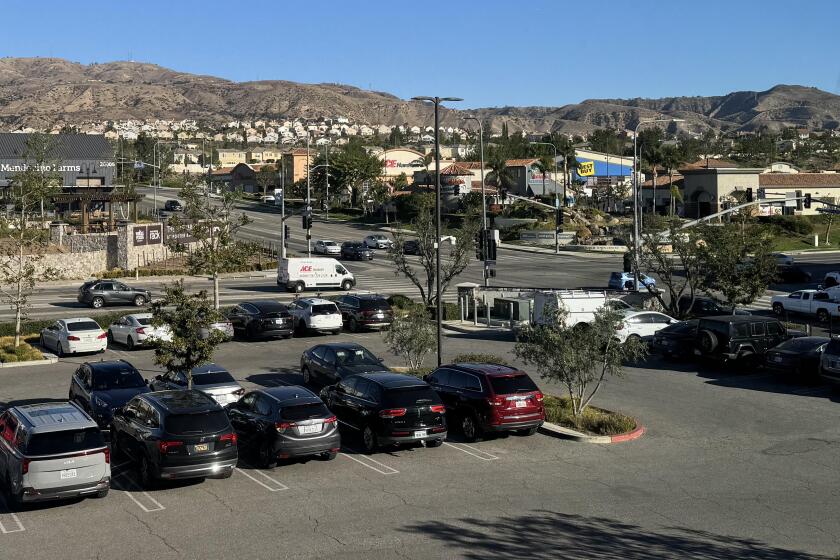Column: Disturbing trend continues as Naomi Osaka deals with verbal harassment
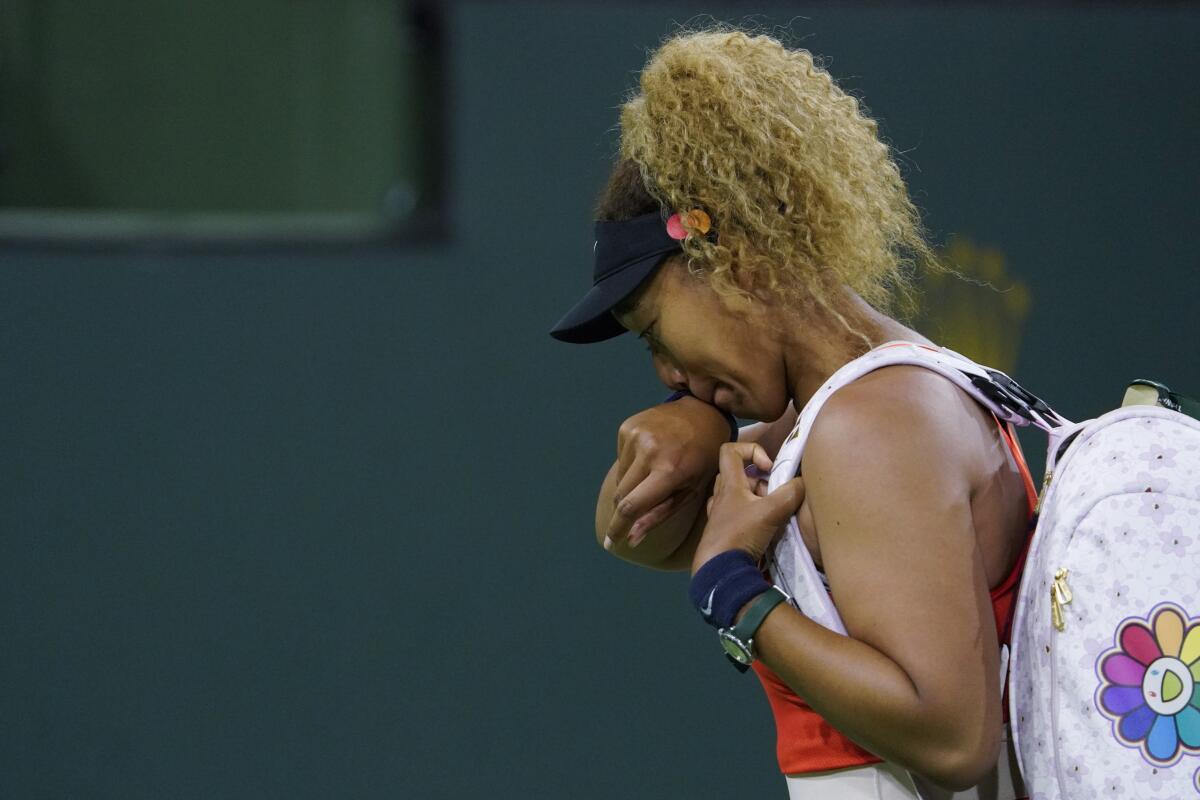
- Share via
The words had a piercing clarity in the silence dictated by tennis custom. They had the effect of a dagger to the heart of Naomi Osaka, who was regrouping after her serve had been broken by Veronika Kudermetova in the opening game of their second-round match at the BNP Paribas Open late Saturday.
“Naomi, you suck!” came the cry from above the court in Stadium 1 at the Indian Wells Tennis Garden. Osaka, who has been admirably open about battling depression and took a long mental-health break last year, became tearful and agitated. Although other spectators cheered and chanted her name, she was blanked in the first set and outplayed 6-4 in the second by Kudermetova, who’s on the rise but hasn’t approached the level Osaka, a four-time Grand Slam singles champion, can reach at peak form.
It’s important to understand why Osaka was so profoundly upset at something that was far from the worst epithet ever hurled at an athlete or the most offensive sentiment uttered at a game in recent memory.
This season alone, a woman sitting courtside in Indianapolis told Lakers star LeBron James she hoped his son Bronny would die in a car accident. At James’ urging, the woman and her companion were ejected. Lakers teammate Carmelo Anthony asked for the ejection of two fans at Wells Fargo Center in Philadelphia after he said they called him “boy.” Austin Rivers of the Denver Nuggets, angered by insults targeting his family during a game in Oklahoma City, had two fans ejected from their courtside seats.
Sadly, there’s an ever-growing list of incidents involving spectators who believe the price of admission buys them the right to go beyond routine booing to launch personal insults. Did long months of COVID isolation make us forget how to behave in public and play in the sandbox with other people?
Osaka, who is of Black and Japanese heritage, said the taunt Saturday had led her to think about the racial abuse heaped on superstar sisters Serena and Venus Williams and their father, Richard, here in 2001 after Venus’ late withdrawal from a scheduled semifinal against Serena. Richard Williams was accused of manipulating the results of his daughters’ matches, which he denied.
Rafael Nadal could barely walk six months ago because of his recurring foot problems, but this week he’s grateful to be in fine form at Indian Wells.
The sisters said they were traumatized and stayed away from an event that prides itself as being just a small step below the four Grand Slam events in popularity and stature. Serena Williams didn’t return until 2015. Venus returned in 2016. Neither is competing here this year.
“To be honest, I’ve gotten heckled before. It didn’t really bother me, but it’s like, heckled HERE,” Osaka said during a post-match interview on the court. “I’ve watched a video of Venus and Serena getting heckled here, and if you’ve never watched it, you should watch it. And I don’t know why, but it went into my head and it got replayed a lot.
“I’m trying not to cry. I just want to say thank you and congratulations [to Kudermetova]. Just thank you.”
Twice during the match, Osaka asked chair umpire Paula Vieira Souza about ejecting the spectator. The umpire said that would happen with a second occurrence. Tournament organizers and the Women’s Tennis Assn. did not respond to requests for comment Sunday.
Retired tennis great Martina Navratilova called it “heartbreaking” that someone would insult Osaka and also that Osaka had been affected so deeply. Navratilova also said Osaka would have to “toughen it out somehow” in the future and said Black players Althea Gibson, Chanda Rubin and Zina Garrison had endured tougher experiences in the sport than Osaka has had. It’s tricky telling people how to feel when we’re all shaped by different cultural factors and have different emotional trigger points.
“This is something that she needs to deal with because it will happen again most likely,” Navratilova said in her role as a Tennis Channel commentator. “If you can’t, then don’t play until you can handle it because this is just heartbreaking for everybody. Take care of yourself first.”
Emma Raducanu, surprise winner of the U.S. Open last year at 18, has struggled since then as have many rising stars who have won Grand Slam titles.
Former men’s tour player Paul Annacone, now a coach and commentator, urged Osaka to prioritize her well-being. “Make sure that’s under control and in an area that she can manage,” he said on a Tennis Channel panel discussion.
“We’ve also all been to sporting events, and we all know that at sporting events you hear stuff and people shout stuff that they probably shouldn’t. … It’s very sad. I hope Naomi and her team can talk about it. I want her to be happy. I want her to play. We want to see her play. We want to see her healthy and feeling really good about things. Don’t let that get through you.”
Crowd outbursts stand out in tennis and in golf, which demand quiet before and during play. At NFL games, one heckler’s voice gets lost among 60,000 others. The same is true on a smaller scale at baseball and hockey games, where conversations, music and in-game promotions make noise a constant and customary background. The NBA invites player-fan interaction because fans are closer to the players than in any other sport. That leads to the sports equivalent of road rage, where fans take out their hostility on the nearest target.
Before the tournament began, Osaka said she felt like she was at peace with herself. Unfortunately, that peace was too fragile to last, broken by a few words that did nothing to make the world a better place and everything to inflict needless hurt.
More to Read
Go beyond the scoreboard
Get the latest on L.A.'s teams in the daily Sports Report newsletter.
You may occasionally receive promotional content from the Los Angeles Times.

